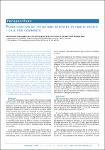Prioritisation of infectious diseases in public health - call for comments
Krause, Gérard
In order to allocate rationally resources for research and surveillance of infectious diseases at the level of the German public health institute (RKI), we prioritised pathogens by public health criteria. After screening the relevant literature we developed a standardised methodology including a three-tiered scoring system for selected pathogens. The pathogens were rated in four categories containing a total of 12 criteria: burden of disease including incidence, severity, mortality; epidemiologic dynamic including outbreak potential, trend, emerging potential; information need including evidence on risk factors/groups, validity of epidemiologic information, evidence for pathogenesis; international duties and public attention; health gain opportunity including preventability, treatability. For each criterion a numerical score of +1, 0 or -1 was given and each criterion received a weight by which the numerical score of each criterion was to be multiplied. The total weighted scores ranged from +22.7 (influenza) to - 64.4 (cholera) with the median being -22.9 (rubella). Relevant changes were observed between weighted and unweighted scores. The chosen approach proved to be feasible and the result plausible. However, in order to further improve the methodology we invite experts to give feedback on the methodology via a structured web-based questionnaire at www.rki.de/EN > Prevention of infection > Infectious Disease Surveillance > Pathogen prioritization. Results of this survey will be included in a modification of the methodology.
No license information

